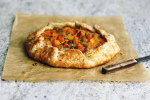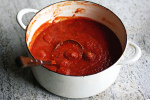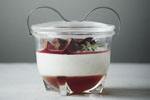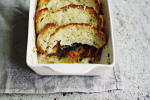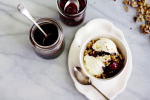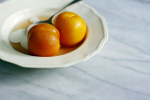Quick fixes; reviewing Delia's How to Cheat at Cooking and Everyone Can Cook Midweek Meals
 Tuesday, August 12, 2008 at 1:20PM
Tuesday, August 12, 2008 at 1:20PM 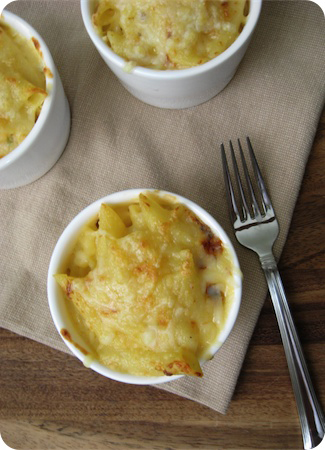
Eric Akis' Skillet Mac and Cheese (yes, I know, I used penne and I served it in ramekins; I am quirky like that).
It is interesting how the world works sometimes. Just before our household grew from three to four, I was offered the opportunity to review not one, but two books on the subject of quick meals for busy cooks.
Everyone seems to be talking about how hard it is to find the time to cook. Sandra Lee has become a household name thanks to her "semi-homemade" mantra, Donna Hay has two books devoted to "instant" cooking and entertaining, and almost every magazine on the shelf is emblazoned with promises of "10 meals in under 10 minutes" or "faster takes on family favourites." Of course, there is also the juggernaut that is Rachel Ray, promoting under-30 minute cooking through her multi-media empire.
What is even more interesting is that, as it happens with any campaign, there are factions in the quick-cooking industry. Some believe it best to simplify the ingredients and methods while others make use of prepared foods to do some of the work for you.
As luck would have it, the two titles that came across my desk, Everyone Can Cook Midweek Meals (Whitecap, 2008) by Eric Akis and Delia's How to Cheat at Cooking (Ebury Press, 2008) by Delia Smith, each represent a side to these seemingly divergent approaches.
Because I received these books pretty much simultaneously, and because of their similar subject matter, I could not help but compare and contrast their styles as I looked over their content. And so, I thought it might be interesting to review these books side-by-side, as this really is such a huge market in the food world right now and this was an opportunity to study the two camps of this "fast" food movement.
I have chosen to break my analysis down into categories, for ease of quick comparison.
The authors and their philosophies
Eric Akis, food writer for the Victoria Times Colonist, seeks to inspire the home cook to tackle cooking after work or preparing meals ahead of time. His is straightforward and simple cooking, with (mostly) short ingredient lists and quick-to-prepare instructions. While there are a few intermediate recipes in terms of procedure and cuisine, Everyone Can Cook Midweek Meals focuses on giving the reader a repertoire of basic meals that allow for personal variation and are most likely appealing to a larger audience.
Akis positions himself staunchly against packaged and/or processed convenience foods. His introduction spells out his feelings quite specifically, mentioning his concern that too much sodium and preservatives in packaged foods can compromise the palate, and that the frequent use of what he calls "instant" meals colour children's perception of what food is supposed to taste like. His aim is to take the stress and worry out of midweek meal preparation, believing that with a well-stocked pantry and shortcut recipes even the busiest person can find scratch cooking a pleasure instead of a chore.
Six years after retiring from the cookery world, famed British cookbook author and television personality Delia Smith returns with the reworking of her 1971 debut How to Cheat at Cooking. In contrast to Akis' manifesto, Smith features recipes that promote grocery store shortcuts (specifically in the form of prepackaged foods and already-prepped ingredients) that are then used in the assembly of other dishes.
She considers the ability to produce meals, with minimal effort and time invested, a liberating experience. Smith encourages the use of the storecupboard and the freezer, seeing these to be invaluable resources to the hurried cook. Why stir slowly-caramelizing sugar, when someone else will make it into toffee and jar it for you? The same goes for slicing onions, grating cheeses and making tomato sauce. But this is only the beginning; Smith proudly dons the currently-unfashionable mantle of one who takes premade a step further, introducing the reader to tinned minced lamb, purchased pancakes, sachets of risotto and, what looks to be Smith's favourite ingredient - frozen mashed potatoes. She not only uses these ingredients, but she is also exceedingly particular about them; indicating the exact product, by brand name, that should be used in the recipe. Substitutions are frowned upon.
The books
Everyone Can Cook Midweek Meals seems to follow the style of the predecessors in the Everyone Can Cook series (it should be noted that I am not very familiar with the other titles). Vibrant colours and casual settings reinforce Akis' comforting home-cooking style. The photos, shot by Michael Tourigny and styled by the author himself, are cropped closely with the food usually filling most of the frame. Clearly laid out and easy to read, each recipe header includes the preparation time, cooking time and number of servings - a helpful tool for the truly time-starved.
Even though the book's sections can be a bit kitch in their titles ("Splendid Sides" and "Nifty Noodles", for example), they do cover a good deal of subject matter. Chapters on pantry staples, types of meals, various cuisines and cooking methods, offer the reader a well-rounded course in quick-cooking basics. That said, the more experienced cook may find this book to be too limited in its offerings. While it is not explicitly aimed as a book for beginners, notes on subjects such as what makes a vinaigrette and how to purchase fish might be redundant to some. Furthermore, dishes like breakfast parfaits are simple enough that they hardly require a recipe.
Delia's How to Cheat at Cooking is a very pretty book; the typeface, the layout and styling all work together beautifully to create a very modern, slightly spare aesthetic. It is beautifully designed by Vanessa Holden, and John Kernick's evocative photography accompanies almost every recipe. The result is a cookbook that looks pared down, refined, and very much in keeping with prevailing trends in cookbook and food publications.
After a lengthy section of introductions that outline in detail Smith's thoughts on shopping and cooking, the chapters are arranged in a loose interpretation of seasonal divisions and food for specific moods. For example, "Cool!" is the chapter containing recipes for the balmy days of summer, while "Capers in the Larder" explores the possibilities of the pantry. As to be expected, "Asian Express" and "Pronto Italiano" cover dishes from their respective cuisines. The book finishes with an extensive list of suggested ingredients to always keep on hand, and there is a repeated notation throughout the book that this list is kept up-to-date on Delia Smith's own website.
The recipes
Eric Akis has filled this book with dishes that would appeal to a wide audience. These are comfort-food basics, with few exotic ingredients or complicated techniques. Pastas, soups, stews and sweets are all well represented. Casual and satisfying, Akis' food is the sort you would want to eat curled up on the couch after a long day.
The chicken-fried steak with pan gravy is rich and hearty, with a simple white sauce as the decadent counterpoint to crispy double-dredged steaks (dried sage is a particularly nice addition to the coating mix). Chickpea Burgers are kept moist thanks to tahini and grated vegetables, and are well-seasoned with cilantro and curry. The fish tacos are family-friendly, especially when topped with the optional homemade guacamole. Fresh and bright with lime, the creamy spread goes beautifully with Akis' marinated baked fish. Tangy and creamy, the Easy-Peasy Lemon Pie would be far from daunting to the novice baker, and the results match up well against more complicated versions.
Of particular interest was the roux-less Skillet Mac and Cheese (pictured, above). Promising a cook time close to that of most boxed macaroni and cheese dinners, it comes together first on the stovetop and is then quickly blitzed under the broiler for a crust similar to long-baked recipes. While the dish did not offer the same creamy, savoury depth as more labour- and time-intensive versions, it was a reasonably good stand-in for a midweek meal.
While far from ground breaking, Akis' has compiled a solid set of recipes that can be prepared by a novice cook.
In Delia's How to Cheat at Cooking the recipes are far-reaching in their scope. Moroccan Chicken with Preserved Lemons and Chickpeas appears alongside Caribbean Chicken with Salsa and Chicken and Leek Pot Pie. Asparagus with No-Panic Hollandaise turns the original on its head, opting out of the time consuming vinegar reduction and then emulsification for a tangy mix of crème fraîche, lemon, egg yolks, softened butter and cornflour. With less fat and no risk of splitting, the sauce did provide the unctuous mouthfeel of Hollondaise without the stress of its preparation. Sprightly Vietnamese Spring Rolls are stuffed with prawns, crunchy vegetables and herbs, and studded with peanuts; these are perfect for a light lunch or snack. Chocolate mousse is not out of Smith's reach; hers is made with ricotta cheese blended with crème fraîche for its base and is delicious but light. I had hoped to try the recipe for chocolate cake that called for 6 discs of mashed potatoes as an ingredient, but I could not find the kind required.
Herein lies the problem that comes up over and over again in Delia's How to Cheat at Cooking; as the author has been so adamant in her instruction to use brand name products, those in areas where these are unavailable are seriously disadvantaged. A worldwide audience may be unable to source products from the UK and Europe easily, rendering many recipes useless. Substitution is at times impossible as trademarked spice blends are used as the primary seasoning or the measurements are based on the portion size of specific products. If similar-sounding items can be found to swap in, it is uncertain how close result would be to the dish that Smith had intended.
This reliance on prepared foods sometimes seems unnecessary and almost creates as many problems as it solves. Although time is saved in the kitchen, even Smith herself admits that shopping takes longer as trips to multiple shops is necessary to find the particular brands.
Finally, the brand-particular favouritism inspires a new type of food snobbery (something Smith admonishes in her introduction); Italian packets of risotto are assumed to superior to a domestic product and onions sliced and softened in Spain are essential. But how can one with good conscience, in a world where concerns of carbon footprints and the support of regional agriculture are paramount, actively choose imported ingredients when local might be available and possibly taste better than those from abroad?
The conclusion
As much as I am tempted to consider these books mutually exclusive, neither truly are; there is a large middle ground. Though Eric Akis rallies against packaged foods, his stance is not without exception. He uses canned beans, pestos, curry sauces, bought stocks and tinned fish. While we may not think of these as convenience items, they do technically fall into that category and are likely to be staples in most homes. At the same time, Delia Smith includes recipes that are completely homemade and that simply employ tricks to expedite the preparation process. And in an ironic coincidence, these two books include recipes for the same dishes.
Everyone Can Cook Midweek Meals is a good beginner's guide to easy meals that can be prepared in a short time. Akis' approach is friendly and easy to follow, making it an accessible resource for those looking for healthy home-cooked meals. His tips are relevant and those packaged ingredients used are readily available.
Smith gives the readers time-saving reworking of well-known recipes, even as she expands the uses of prepared foods with the book Delia's How to Cheat at Cooking. Poshly presented, the book appeals to the foodie at heart, but one without the time, the desire or possibly the skill to prepare meals from scratch. She positions herself in a field outside of television cookery or vaulted art; Smith calls this an opportunity to "revolutionize your life" - with canned bisque firmly in hand.
Either way, it is evident that there is a desire to make food preparation faster, it is up to the reader (or the cook) to decide their speed limit.
Skillet Mac and Cheese
Excerpted with permission from Everyone Can Cook Midweek Meals by Eric Akis (Whitecap, 2008).
Preparation Time: 10 minutes
Cooking time: 9-12 minutes
Makes: 4 servings
Here's a quick stovetop way to make macaroni and cheese and still have the heavenly crust of an oven-baked version. I serve it with whole wheat dinner rolls and a platter filled with raw fresh vegetables, such as celery, carrot and cucumber sticks, broccoli and cauliflower florets and cherry tomatoes.
Ingredients
2 cups (500 ml) macaroni
2 cups (500 ml) milk
3 tablespoons (45 ml) all-purpose flour
1/4 (1 ml) teaspoon paprika
2 cups (500 ml) grated cheddar cheese
salt and white pepper to taste
Bring a large pot of lightly salted water to a boil. Add the macaroni and cook until just tender, about 6-8 minutes. Meanwhile place the milk, flour and paprika in a bowl and whisk until lump-free, Pour into a 10-to-12 inch (25 to 30 cm) nonstick ovenproof skillet and set over medium heat. Cook the mixture, whisking frequently, until it gently simmers and begins to thicken, about 5 minutes. Mix in 1 1/2 cups (375 ml) of the cheese; season with salt and white pepper. Cook and stir until the cheese melts; reduce to low heat. Place an oven rack 6 inches (15 cm) beneath the broiler; preheat the broiler.
Drain the cooked macaroni well and mix into the cheese sauce. Stir in a little extra milk if you find the consistency too thick. Remove from the heat. Sprinkle the remaining 1/2 cup (125 ml) of the cheese overtop and place under the broiler until it's nicely browned, about 3-4 minutes.
Eric's Options
• To add some protein to this dish, mix in a can (6 oz/170 g) of chunk tuna, drained well and coarsely flaked, or 1 1/2 cups (375 ml) of cubed ham or cooked chicken.
Recipes from Delia's How to Cheat at Cooking
A selection of recipes from the book can be found here.


Cover art courtesy of Whitecap Books and Ebury Press, respectively.


